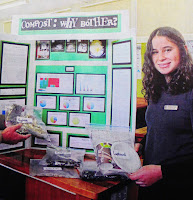Learning at Home during the 'Lock down'
(I haven't written a blog for months but thought I would share a few ideas that i had posted on Facebook. There are still people viewing my blog so here goes)
Learn Five New Things a Week
I heard yesterday on National Radio an interesting idea for students to do at home ~ get them to learn five new things a week ~practical things like learning to cook something new, or study something of personal interest etc Students could make a list of things they want to learn about - a personalized curriculum.
I note a lot of school sending out worksheet activities for their students but I feel the situation requires something more creative. Too many worksheets would not be a good idea - time to think out of the box.
Set up a 'My Learning Journal /Scrapbook'.
Students could set up a My Learning Journal to record activities ~could make a wonderful family historical artifact to share in the future?
Set me thinking of other possible home learning tasks like:
Sorting family photos and making a PowerPoint presentation to share with the family
Finding and writing up family histories from mum and dad.
Develop a family reading group and share what each member has been reading (keep a reading log)
Draw something every day (maybe choosing something from their environment),
Keep a diary of events as the situation unfolds ( think of Anne Franks)
Write a short poem each day and illustrate to share
Research the photos and ornaments around the home - there is usually a story behind each picture /ornament
Do personal research project on something of interest each week (make a list of ideas to add to and then choose o to study),
With mum and dad keep a record of family spending,-learn basic budgeting.
Do a research study of a family pet - how to care for them, how they evolved to be pets how wild animals relate to domestic pets.
Learn to use basic Te reo phrases as a family (school could supply or google them),
Learn to play a musical instrument (possibly not a recorder!). Develop a simple percussion band with siblings (in the backyard),
Develop a PE obstacle track in the backyard.. Time and record how long it takes to get around How many balls can you catch before dropping a catch; develop a short cycle of fitness activities,;play skipping and catching balls game ~make a record of improvement.
Try out different art activities ~simple printing (potato printing) /using different media.
Take digital photographs on a phone and select five to share/print. Could set a theme nature photos for example.
Research some simple science activities to do using Google , for example kitchen science (all baking is science)
Technology challenges ~like make a bridge from rolled newspaper or experiment how far can your paper dart can fly,/lesson on keeping safe
Learn the names of flowers in the garden ~research them on Google
You might want to learn about viruses ~sure is plenty of information. Guess most parents will have had a family meetings to discuss the virus with family members.
Just thought some of the above may be of interest?
And that the list above may also encourage you to think of your own activities
A bit of advice ~try to encourage kids to take their time. Too often they think first finished is best
On reflection the ideas above cover all the Learning Areas of the New Zealand Curriculum and , in particular, the phrase every student should 'seek , use and create their own knowledge'.



































